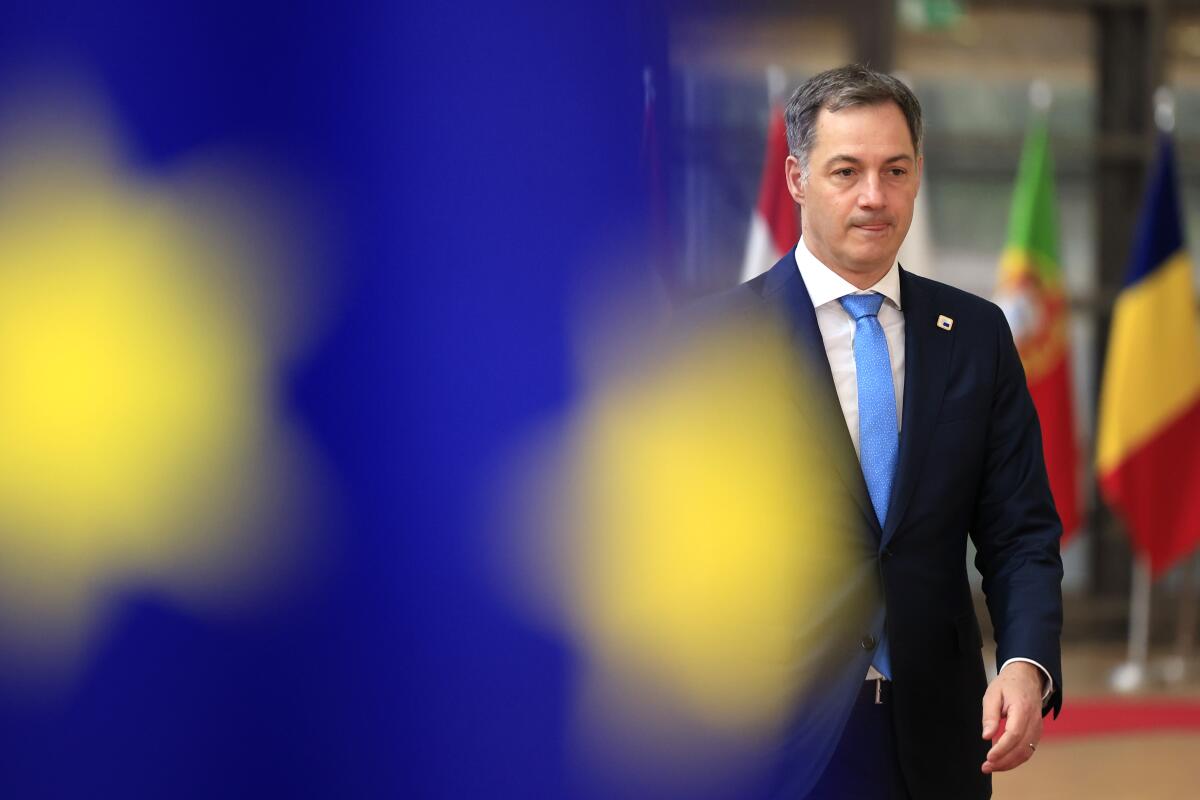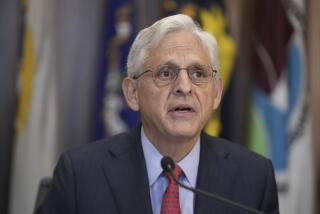Russia suspected of interfering in upcoming European elections; Belgium investigates

- Share via
BRUSSELS — Belgian Prime Minister Alexander De Croo announced on Friday an investigation into suspected Russian interference in June’s Europe-wide elections, saying that his country’s intelligence service has confirmed the existence of a network trying to undermine support for Ukraine.
“Belgian intelligence services have confirmed the existence of pro-Russian interference networks with activities in several European countries and also here in Belgium,” said De Croo, whose country currently holds the rotating presidency of the European Union.
De Croo said Belgian agencies were working closely with Czech authorities after a pro-Russian influence operation was uncovered there. He said that probe showed that members of the European Parliament were approached and offered money to promote Russian propaganda.
“According to our intelligence service, the objectives of Moscow are very clear. The objective is to help elect more pro-Russian candidates to the European Parliament and to reinforce a certain pro-Russian narrative in that institution,” he told reporters.
Elections are being held across Europe on June 6-9 to choose a new EU Parliament.
Could Ukraine lose the war? Once nearly taboo, the question hovers in Kyiv, but Ukrainians believe they must fight for their lives against Putin’s troops.
De Croo said the “the goal is very clear: A weakened European support for Ukraine serves Russia on the battlefield and that is the real aim of what has been uncovered in the last weeks.”
Last month, Latvia’s state security service started criminal proceedings against 73-year-old Latvian EU lawmaker Tatjana Ždanoka over alleged Russian ties. Reports on Russian, Nordic and Baltic news sites in January alleged that she had been an agent for the Russian Federal Security Service since at least 2004.
EU nations have poured billions of euros into aid for Ukraine, along with significant amounts of weaponry and ammunition. They’ve also slapped sanctions on top Russian officials, including President Vladimir Putin, banks, companies and the energy sector since the full-scale invasion in February 2022.
But as the war has dragged on, with Russian troops appearing now to hold a slim advantage, that support has become increasingly difficult to sustain. Hungary, Putin’s closest European supporter, has held up the delivery of funds to Ukraine and is demanding that peace talks be held.
U.S. intelligence agencies concluded that Putin ordered a hidden campaign to influence the 2016 presidential race in favor of Donald Trump over Democrat Hillary Clinton, with Russian operatives hacking Democratic emails and facilitating their release in the run-up to the election.
More recently, they concluded that Putin had authorized influence operations in the 2020 election aimed at denigrating Joe Biden, boosting Trump, undermining confidence in the vote and exacerbating social divisions in the U.S. Trump and Putin have dismissed such findings.
Referring to the investigation by Belgian prosecutors, De Croo noted that “the cash payments did not take place in Belgium, but the interference does.”
“These are serious concerns and that is why I have taken action,” he said. “We cannot allow this type of Russian menace in our midst. We need to act, and we need to act both on the national level and we also need to act on the EU level.”
He provided no details about who might be under suspicion. Belgian authorities uncovered an influence-peddling operation at the European Parliament in December 2022 involving officials from Qatar. The government of Qatar has denied the allegations.
The parliament’s media service said only that it takes note of the decision by the Belgian justice authorities and that the assembly would cooperate with the probe if requested. It added: “We do not comment on ongoing investigations.”
Only this week, EU lawmakers debated allegations of Russian interference in the parliament and the elections, as well as what impact it might have on the bloc. They are expected to adopt a resolution on the matter at their next plenary session in Strasbourg, France, starting on April 22.
At a summit of EU leaders last month, parliament President Roberta Metsola warned that the possibility of election interference “will be the test of our system” during the June polls.
“We are seeing attempts in many states to push disinformation, misinformation and propaganda which come from actors hostile to the European project. We cannot allow this destructive narrative, propaganda and disinformation to spread without countering it,” she said.
Cook writes for the Associated Press.
More to Read
Sign up for Essential California
The most important California stories and recommendations in your inbox every morning.
You may occasionally receive promotional content from the Los Angeles Times.











